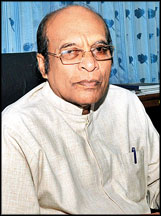National Policy for Human Resource Development in the offing
By L.S. Ananda WEDAARACHCHI
A National Policy for Human Resource Development and Employment will
be launched, said Senior Minister of Human Resource Development DEW
Gunasekera in an interview with the Sunday Observer.
He said that the task for which Cabinet approval had been obtained is
nearing completion.
Excerpts of the interview:
Q: The education system plays a major role for the optimum
utilisation of human resources which is vital for development. No doubt
that Sri Lanka's education system is outdated, your comments.
|

Senior Minister DEW Gunasekera |
A: We should realise the current needs of the country. Sri
Lanka is no longer an agricultural country. The contribution of the
service sector to the GDP ranks the highest. It provides more job
opportunities.
The reality is that some sectors do not get sufficient skilled
manpower to fill vacancies. About 500,000 youths sit annually for GCE
(O/L) examination but only 300,000 qualify for university entrance. The
dropouts amount to over 200,000. Only 25,000 could seek admission to
State universities.
This is a proof of the poor education system and the tragedy of the
youth. This situation has to change. When Deng Ziya O Peng came to power
in China 10,000 youths were sent to Europe for higher studies on
electronics and engineering. They are the leaders of today's China.
They took a lead in China's crash development programme. Human
resource development is vital for the economy. President Mahinda
Rajapaksa has understood its importance to the country.
Q: What are your proposals to reform the present education
system in Sri Lanka?
A: We should implement a system of education which will help
youth to be competent to steer the economy.
Some of the subjects in the secondary and higher education curriculum
cannot cater to the present day needs.
New subjects and new methods have to be introduced to the secondary
and higher education curriculum. In India there is a planning commission
and a minister of human resource development instead of a Minister of
Education.
Q: Dr. S.A. Wickramasinghe, Philip Gunawardena and Dr. N.M.
Perera and other leftist politicians pioneered the leftist movement in
Sri Lanka. There is an argument today that the present leaders of LSSP
and CP have deviated from the gospel of the gurus. The JVP is very
vociferous in its criticism of this scenario. Your comments?
A: The Left Movement was launched against colonialism and
capitalism. During the past seven decades a major change has taken place
locally and globally.
The Left Movement in Sri Lanka had successfully faced challenges and
fulfilled its mission for the betterment of the working class. The
October revolution changed the face of Russia and led to the transition
from capitalism to communism.
The theories in the Das Capital are still valid and the world is
accepting the philosophy to develop economies. Some segments of the JVP
are running after its founder Rohana Wijeweera to restructure the party
while they should in fact go after Karl Marx if they need to effect a
true change.
Q: What is your opinion about USA policies towards Middle East
and Asia?
A: America has been in crisis for years and they have no way
of getting rid of the crisis. China, India, Brazil, Russia and South
Africa have become emerging economies in the world, with Asia - the
controlling world economy.
Imperialist countries led by America seek refuge in Asia for survival
when they cannot cope with global changes. They act in the guise of
human rights and war crimes to suppress other countries.
Q: How do you look at the JVP's internal conflict?
A: The JVP has been changed its policies and stance from its
inception.
The JVP found in 1960s based on Mao Zedong's policies and the Chinese
leaders. The present Chinese leaders conceded that the policies
practised by their leaders in 1969 were wrong and it led to youth
unrest.
Rohana Wijeweera who contested the Presidential election supported
separatism and Tamil demand for self-determination.
After few years the JVP subsequently changed their policies and were
supported the one country policy and Anti India policy. Once they teamed
up for a coalition government and now they are against it. It is no
wonder that such a political party could change its stance to suit its
political needs.
Q: When will the next COPE report be out?
A: For the first time this Parliamentary body had investigated
249 government ventures including universities, corporations, and other
institutions. The previous COPE committees investigated only less than
20 State institutions.
Some State ventures such as the Moratuwa University were commended
for excellent management. Inefficient and unsuccessful institutions will
be exposed in our report to be presented to Parliament during the budget
debate.
|

